JULY/AUGUST 2024 | VOLUME 33, NUMBER 6
Remembering Lyndsey Vicknair
Austin Bar member Lyndsey Captain Vicknair passed away on June 15, 2024, during a shooting at Old Settlers Park in Round Rock.
Vicknair was born on Dec. 31, 1990, to Bobby and Lena Captain. She was a beloved wife, mother, daughter, sister, granddaughter, and friend. She is survived by her husband of seven years, Kevin Vicknair, and their young children: Kenzi (7), Kairo (4), and Kya (1). She is also survived by her dear sister, Laura-Marie Captain, grandmother Maya Marie Captain, and numerous cousins and close friends.
Vicknair graduated from Mansfield High School in 2008 and earned her bachelor’s degree in criminal justice from Prairie View A&M University in 2010. She earned her J.D. from South Texas College of Law in 2013; an LL.M. in entertainment and media law from Southwestern Law School in 2015; and an MLS in oil, gas, and energy from the University of Oklahoma in 2020.
Her legal career began in 2011, when she served as a judicial clerk at the Harris County Criminal Justice Center. In 2012, she worked as a legal assistant at Paris & Associates, a firm in Houston, where she drafted petitions, modifications, and motions for family law cases. She also took witness statements
for tort cases and created affidavits.
In 2013, she worked as a legal intern at CBIC Construction & Development, where she managed the firm’s licensing in 12 states and helped create the firm’s legal department. Also that year, she worked as a law clerk at the Crim Law Firm, where she assisted the litigation department in organizing meetings with clients and gathering information for personal injury cases.
In 2014, she went to work for Purple Land Management as a title attorney. There, she conducted land title research and compiled data to generate mineral ownership reports. In late 2014, she returned to Paris & Associates, where she served as second chair in arbitration and administrative proceedings, as well as drafted motions, pleadings, filings, conveyance documents, and negotiated contracts and settlements on behalf of clients.
In 2017, she moved to the Dallas-Fort Worth Area to serve as the legal and compliance officer for Pony Oil. Also during this time, she established her solo practice, which focused on entertainment and intellectual property law.
In 2020, she worked as an attorney adviser for the U.S. Army Corps of Engineers. In 2021, she began practicing with the Chapman Firm. She joined the Austin
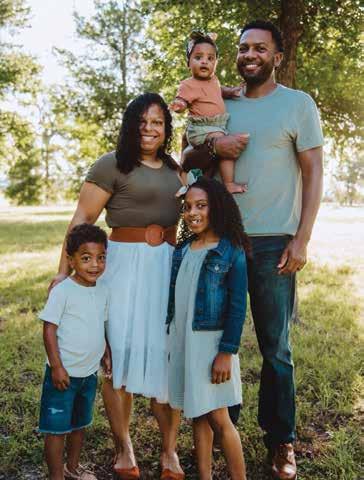
Bar and AYLA in 2021. In 2023, Vicknair was named a Texas Super Lawyer Rising Star in construction litigation.
Vicknair was also an active member of the State Bar of Texas Construction Law; Oil, Gas, and Energy Resources Law; Entertainment and Sports Law; and African American Lawyers sections.
Vicknair enjoyed traveling, live music, and attending live sporting events with her husband. Together with their three young children, they gave back to the community by organizing fundraisers and food drives, and participating in other community outreach events.
Following her son’s diagnosis with sickle cell disease in 2020, Lyndsey became a passionate advocate for sickle cell awareness.
The entire Vicknair family has been deeply involved with the Austin Honey Badgers Track Club, a nonprofit youth organization. Candice Cooper, a co-founder of the club, set up a GoFundMe to support the Vicknairs.
“Lyndsey’s life was marked by her contagious smile, thoughtfulness, and her unwavering willingness to help others,” Cooper wrote on the GoFundMe. “Her absence is
Trusted by 50,000 law firms, LawPay is a simple, secure solution that allows you to easily accept credit and eCheck payments online, in person, or through your favorite practice management tools.





AU ST INL AW Y ER
billy@austinbar.org
Bar Association 712 W. 16th Street
78701

NEWS & ANNOUNCEMENTS
LGBTQ+ Scholarship Applications Open Applications for the LGBTQ+ Scholarship are now being accepted! Four $5,000 scholarships will be awarded to current students (including 2024 graduates) enrolled at a Texas law school. Visit austinbar.org to access the application form and full list of requirements. Applications close on July 31, 2024.
July 26 Abortion Bans, Criminal Law, & Pregnancy Prosecution in Texas Noon – 1:00 p.m. Zoom Register for free at austinbar.org.


FOLLOW instagram.com/theaustinbar
vimeo.com/austinbar CONNECT https://www.linkedin.com/ company/austin-barassociation
Texas legal
that insured all areas of practice, including those not often insured by other carriers. You wanted numerous limit and deductible options
a provider that’s flexible enough to serve one to 100 lawyer firms, yet focused on delivering incredible results through stellar service.
2025 Schedule Travis County Civil District Courts
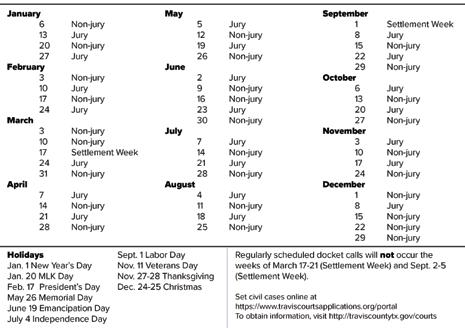










AUST INL AW Y ER AL A
OFFICIAL PUBLICATION OF THE AUSTIN BAR ASSOCIATION
AUSTIN BAR ASSOCIATION
Mary-Ellen King President
Maitreya Tomlinson President-Elect
Judge Maya Guerra Gamble Secretary
Rob Frazer Treasurer
Justice Chari Kelly Immediate Past President
AUSTIN YOUNG LAWYERS ASSOCIATION
Emily Morris President
Jenna Malsbary President-Elect
Gracie Wood Shepherd Treasurer
Lena Proft Secretary
Sarah Harp Immediate Past President
Austin Lawyer
©2024 Austin Bar Association;
Austin Young Lawyers Association
EXECUTIVE OFFICES
712 W. 16th Street
Austin, TX 78701
Email: austinbar@austinbar.org
Website: austinbar.org
Ph: 512.472.0279
DeLaine Ward Executive Director
Debbie Kelly Associate Executive Director
Rachael K. Jones Editor-In-Chief
Billy Huntsman Managing Editor
Austin Lawyer (ISSN #10710353) is published monthly, except for July/August and December/January, at the annual rate of $10 membership dues by the Austin Bar Association and the Austin Young Lawyers Association, 712 W. 16th Street, Austin, TX 78701. Periodicals Postage Paid at Austin, Texas. POSTMASTER: Send address changes to Austin Lawyer, 712 W. 16th Street, Austin, TX 78701.
Austin Lawyer is an award-winning newsletter published 10 times a year for members of the Austin Bar Association. Its focus is on Austin Bar activities, policies, and decisions of the Austin Bar board of directors; legislation affecting Austin attorneys; and other issues impacting lawyers and the legal professionals. It also includes information on decisions from the U.S. District Court for the Western District of Texas and the Texas Third Court of Appeals; CLE opportunities; members’ and committees’ accomplishments; and various community and association activities.
The views, opinions, and content expressed in this publication are those of the author(s) or advertiser(s) and do not necessarily reflect the views or opinions of the Austin Bar Association membership, Austin Bar Association board of directors, or Austin Bar Association staff. As a matter of policy, the Austin Bar Association does not endorse any products, services, or programs, and any advertisement in this publication should not be construed as such an endorsement.
Contributions to Austin Lawyer are welcome, but the right is reserved to select and edit materials to be published. Please send all correspondence to the address listed above. For editorial guidelines, visit austinbar.org in the “About Us” tab.



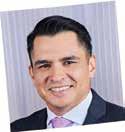













Mary-Ellen King is a partner at Lucosky Brookman LLP, where her practice focuses primarily on complex insurance coverage litigation, commercial litigation, business litigation, general civil litigation, and real estate litigation.
King takes the reins as president of the Austin Bar on July 1, 2024. Austin Lawyer recently interviewed her about her plans for the upcoming bar year.
AL: What are some of your main priorities as president of the Austin Bar?
KING: My chief priority is raising awareness for mental health, substance abuse, and suicide in the legal profession—whether it be lawyers facing these issues or family members of lawyers facing these issues, there are resources available to them, and the Bar is here to help.
Meet Incoming Austin Bar President, Mary-Ellen King
I am also focused on DEI, increasing membership, and pro bono service to the community.
AL: What prompted you to focus on addressing mental health and substance abuse in the legal community?
KING: In late November 2023, I lost my ex-husband, exlaw partner, and father of my son to substance abuse at the age of 55. It was devastating to our family, his clients, and his law practice. Through that experience, we learned of valuable resources available to lawyers and families of lawyers who are in a mental health or substance abuse crisis. I want to make sure everyone knows they are not alone, and that the Austin Bar is here to help them through the crisis.
AL: What are you most excited about for your term as president?
KING: I am honored to use my term to bring awareness to mental health, substance abuse, and suicide, so that people know they don’t have to suffer alone. The

Bar is here for them, and so am I. I am excited about continuing our DEI initiatives, increasing membership, and increasing pro bono service to the community.
AL: What challenges, if any, do you believe the Austin Bar faces as an organization, and how will you address them?
KING: I believe COVID and social media have transformed us as a society. Even though we feel more connected through social media, we are much less connected as a community. Eventually, that can have devastating impacts on our professional development, emotional intelligence, and overall mental health.
The Bar is a perfect way to connect through community in service to others, in service to the bar, and as a profession. I want to increase connection in our legal community, by offering more meaningful opportunities to connect, as well as awareness of those opportunities.
AL: What are some important things that you want Austin Bar members to know about you?
KING: I want to meet the needs of all members of the Austin Bar, and I need everyone’s help to do that. Also, I am human and will make mistakes, so please give me some grace. Finally, I am always here to help someone in crisis by providing resources, coffee, or a listening ear.
AL: Tell us about your plans for your Austin Lawyer president’s column this year.
KING: I plan to use my president’s column to share voices of recovery and help. I welcome anyone who is in recovery to write a guest column and share your story in this space.
Additionally, I want to give the Texas Lawyers’ Assistance Program (TLAP) and the Mack Kidd Fund, among others, a voice through my column, so everyone knows of the invaluable resources they provide.
AL: Tell us what you have planned for your podcast in the coming year.
KING: Like the column, I want to share voices of recovery from

substance abuse, mental health crisis, and thoughts of suicide, in an effort to stop the stigma associated with them. Not only from the perspective of the lawyer who experiences those thoughts and/or crisis, but also from the close-friends-andfamily perspective. It is my belief that through sharing of our stories, we can raise awareness of the resources available and give someone the courage to ask for help. Additionally, I plan to have guests from TLAP, the Mack Kidd Fund, and other programs appear on the podcasts to raise awareness of their resources.
AL: Tell us about your career so far. What drew you to the practice of law? Did you plan on being a litigator in law school?
tor. My first job out of law school was not in litigation, but I never gave up on the dream, and I am so happy I did not. Litigation is not for everyone, but I genuinely love what I do.
AL: What prompted you to get involved with AYLA and the Austin Bar?
KING: I have always had a servant’s heart, and AYLA and the Austin Bar are dedicated to serving the local community through service projects and grants while providing opportunities to interact and network with colleagues in the legal community.
AL: You recently joined a new firm as a partner. What prompted you to change firms?

and Nadia Bettac
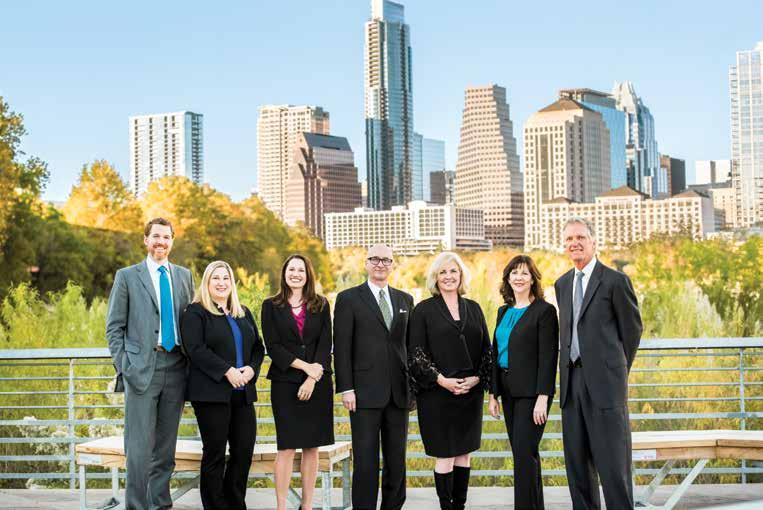
Austin Bar or AYLA activities, we need and want you. Please join us in the upcoming year! Reach out to me at any time, and we can discuss how we can work together to be a stronger bar association. I love my dogs, Snowflake and Babu, the Westlake Chaps, and the Alabama Crimson Tide. And
my heart belongs to my son, Wyatt (9), and my three stepchildren Jacob (26), Josh (24), and Rachel (21). They are the reason I do everything I do! AL
Arielle Rosvall, Coleen Kinsler partners: associate attorneys:
Stories of Recovery: You Can Get Better
Editor’s Note: This article was reprinted with permission from the Texas Lawyers’ Assistance Program (TLAP). TLAP offers confidential assistance for lawyers, law students, and judges with substance use or mental health issues. Call or text TLAP at 1-800343-TLAP (8527), or find more information at tlaphelps.org.
It’s hard to remember a time when I didn’t feel uniquely awful growing up—where I felt deserving of happiness, friendship, and love. I was a weird kid growing up, which probably made the isolation feel worse. But then I discovered alcohol. And alcohol was the miracle for which I had always been searching.
With alcohol, I was the life of the party. I was friendly, charming, and handsome. With alcohol, I felt enjoyed and appreciated in ways that I didn’t think were possible. The lows were awful, but they were worth it to experience the highs— after all, the lows weren’t that much worse than the ones that I had been consistently living with. Eventually though, the mistakes, the embarrassment, and the harm I caused others caught up with me. My first suicide attempt at 19 was a product of being unable to forgive myself, move forward, and to otherwise deal with life. For most people, that would be a wake-up call. For me, it was an excuse to lean into my drink-
ing and escapism with full force.
For the next five years, I spent every weekend, and most weekdays, drowning myself in booze. And then I added cocaine to the mix. Cocaine was great because it allowed me to drink more than ever, but it helped me maintain the appearance of sobriety (or at least being less intoxicated). By the time I was a 3L in law school, I was binging cocaine and booze five times a week, usually in spurts of 12 hours or longer.
At the end, it didn’t matter to me who I spent time with, or how awful they made me feel, so long as I could get drunk and high and not be alone. A guy who I frequently got drunk and high with also sexually harassed me repeatedly, but he was the only one willing to get high on a Tuesday night, so it kept happening. My girlfriend at the time constantly lied to me, publicly and privately berated me, and drunkenly threw things at me, but her moments of affection were better than being alone—and I figured I could cover up the rest with alcohol and drugs, even if it made me emotionally absent. “Friends” used me as I used them. What few values, redlines, goals, and healthy relationships I had quickly took a back seat to an essentially never-ending high.
Things began to unravel as the mounting emotional turmoil began to spill over. As my relationship ended, and the nature of


is power, the not knowing is devastating.”

many of those friendships became unavoidably apparent, I reached desperation and once again attempted to take my own life. I was 27 years old. This attempt resulted in a hospital stay, but even that couldn’t wake me up. I was quickly back to binging, and it took a few more months of embarrassment before I realized that something needed to change.
I checked myself into rehab, and now, approaching almost a year of sobriety, I can safely say that it was the best decision that I’ve ever made. It undoubtedly saved my life—either from the alcohol and drugs, the depression, or both. It seems corny to say, but I have my life back. I’ve been able to address my longstanding depression. I’ve reminded myself of
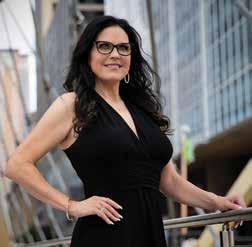
all the loving and caring people in my life, and I have removed those who contributed either to my addiction or my depression, or both. I get to rediscover myself in a way that I would never have been able to while drinking and using. And I get to be there—really be there— for the people that matter to me. That’s not to say it’s been easy, but it’s been worth it. I have hard days. Most people do. But it’s been so fulfilling to face life and its problems rather than to run from them like I used to. I only get one day at a time, but every day is a blessing—one that I’m acutely aware of in ways that I never thought possible. If you’re struggling, know that you’re not alone, your past does not define you, and that you can get better. AL


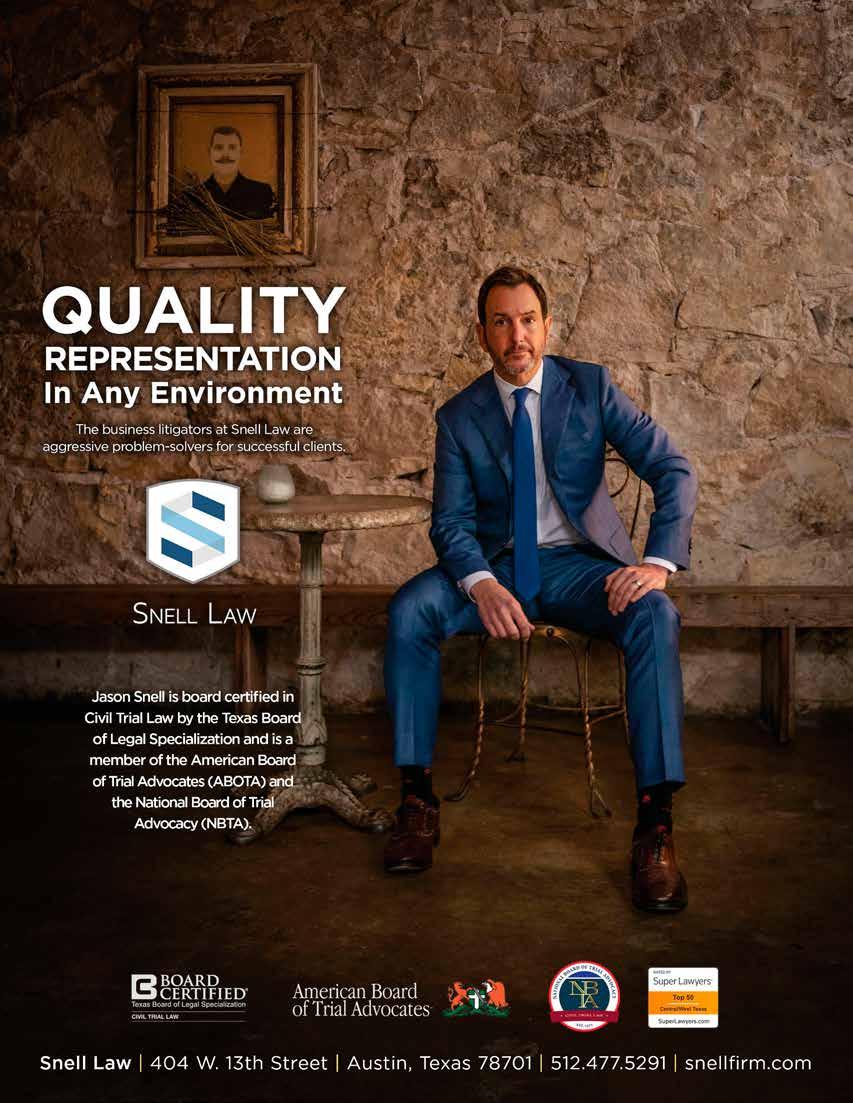
New Members
The Austin Bar welcomes the following new members:
Cameron Blotcky
Justin Bontrager
Carrie Cavalier
Alexandra Curren
Michael Dinnella
Sarah Farid
Mitra Frank
Zachary Gilstrap
Tanner Haynes
Chandler Lawn
Michael McRoy
Amy Olson
Toni Rask
Laura Tucker




KUDOS
Congratulations to Melissa Andrews, equity partner at Holland & Knight, on her appointment to the newly created Third Business Court Division in Austin. Andrews previously served as an attorney for Texas Supreme Court Justice Jeff Boyd and First Court of Appeals Justice Harvey. She is board-certified in civil appellate law by the Texas Board of Legal Specialization. She is the Civil Appellate Section chair of the Austin Bar. She received a B.S. in Political Science and Business from Texas A&M University and a J.D. from UT Law.
Congratulations to Judge Scott Field, who has been appointed to serve on the newly created Fifteenth Court of Appeals. Judge Field currently serves as judge of the 480th Judicial District Court in Williamson County. Previously, he served as a justice on the Third Court of Appeals; was a partner at Butler Snow; was the managing partner of the Field Law Firm and York, Keller & Field; and was an attorney at Baker Botts. He is a longtime member of the Austin Bar and a life fellow of both the Austin Bar and Texas Bar foundations.
Congratulations to Jennifer Freel on being honored with the 2024 Outstanding Federal Lawyer Award from the Federal Bar Association’s Austin chapter. The award recognizes an Austin lawyer who has dedicated a significant portion of their career to federal practice,




as well as someone who exhibits leadership, ethical behavior, mentors younger lawyers, and actively contributes to the legal and broader communities. Freel is a partner in the Investigations & White Collar Defense practice of Jackson Walker’s Austin office.
Congratulations to Scott Weatherford of Jackson Walker, who has been elected to the Austin Bar Civil Litigation Section’s board of directors. Weatherford’s practice focuses on intellectual property, trade secret, and technology-related commercial disputes.
40 UNDER 40
Congratulations to the Austin 40 Under 40 Award recipient and finalists in the Legal category! The 40 Under 40 Awards recognize Austin’s emerging professionals through a rigorous application process that takes both career achievements and community involvement into consideration .
Judge Denise D. Hernández is the 2024 recipient of the Austin 40 Under 40 Award in the Legal category, as well as the Austinite of the Year Award. Judge Hernández is the presiding judge of County Court at Law #6, where she leads the Transformative Youth Justice program, a youth diversion program focused on holistic, community-centered support for young people impacted by the justice system. She is committed to equity, mentorship, and community-building initiatives, and
currently serves on the boards of The Contemporary Austin; Creative Action; The New Philanthropists; and The Rebel Fund. She has been recognized locally and nationally for her community work. She was honored as an Anne McAfee Leader of Cultural Change, recognized as a “racial justice champion” by Notley, and named the “People’s Judge” by Austin Woman magazine. Driven by her lived experience and humble beginnings, Judge Hernández continues to dedicate herself to increasing fair access in the courtroom, mentorship, and implementing collective care and healing-focused approaches in the justice system.
Emily Apte was named a finalist in the Legal category. She serves as counsel at King & Spalding, where she specializes in government investigations, privacy, and fraud matters involving the Department of Justice, the Federal Trade Commission, and Congress. Her roles have included associate general counsel at Meta Platforms and associate director in the White House Office of Presidential Speechwriting, in addition to community-focused service, including working in a rural Ugandan community for multiple years.
Katie Fillmore was named a finalist in the Legal category. A partner at Michael Best & Friedrich, her practice focuses on commercial litigation and government relations. For 14 years, she has held pivotal leadership roles in the legal community and is the longest-serving board member of AYLA. Fillmore has been actively involved in community justice programs, enhancing public understanding of the legal system, and motivating students to pursue legal careers.
Andrea Villarreal was named a finalist in the Legal category. She is a partner at Barnes Lipscomb & Stewart, where she specializes in estate planning, probate, and entertainment law. She serves on the board of Austin Classical Guitar and on the all-woman advisory board of Housing Opportunities for Musicians and Entertainers. She previously served on the board of the SIMS Foundation, which provides mental health and addiction recovery services for musicians.

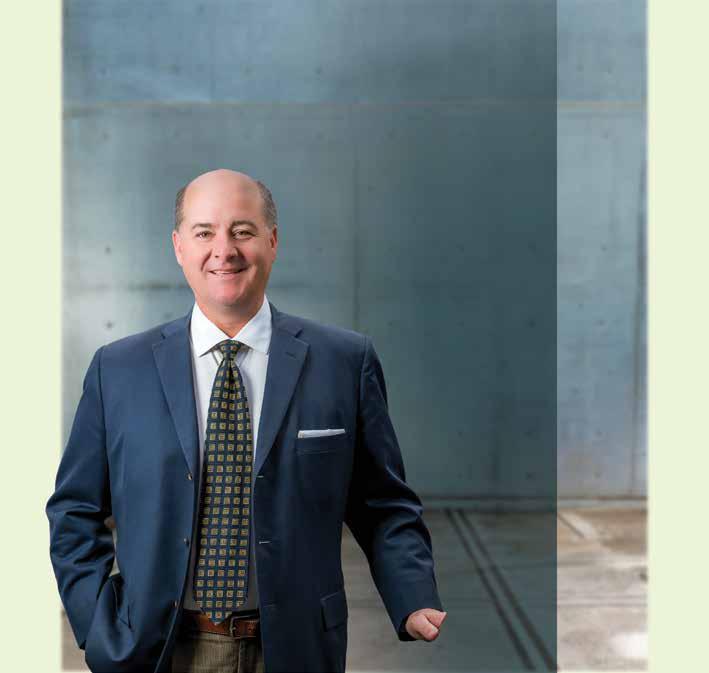



















PRESIDENT’S COLUMN

Emily Morris is corporate counsel at PowerSchool, which develops educational software for school systems. Morris is a graduate of Tulane University Law School and received her bachelor’s in marketing from Louisiana State University. During her time there, she also attended the University of Copenhagen to study international corporate law. Morris is admitted to practice before the Supreme Court of Texas and was named a Texas Rising Star in corporate law by Super Lawyers in 2021 and 2022. She was also named a top real estate lawyer in 2020 and top business lawyer in 2021 and 2022 by Austin Monthly Morris takes the reins as president of AYLA on July 1, 2024. Austin Lawyer recently interviewed her about her plans for the upcoming bar year.
AL: Tell us about yourself. What do you like to do for fun? Pets/ family/activities outside the profession?
MORRIS: I live in south Austin with my family and love exploring the neighborhood parks and music venues here. We have an almost-4-year-old daughter, a little boy on the way this fall, a 19-yearold cat named Skittles who is still active enough to be a pain, and a 10-year-old Lab mix named Layla. Some of my favorite things to do are sing (currently with Pan-
Meet AYLA’s Incoming President, Emily Morris
oramic Voices); go two-stepping; watch LSU sports; and explore new places, both at home and internationally. Our daughter has already been to London, Portugal, Greece, and Canada!
AL: Tell us about your responsibilities as corporate counsel at PowerSchool.
MORRIS: My role at PowerSchool is primarily focused on commercial contracts and leading negotiations with our top customers and vendors. I’ve gotten to support the company’s international expansion through vendors serving PowerSchool’s new market entry and also lead the legal team’s integration of newly acquired products into PowerSchool operations. I enjoy thinking creatively to close deals and working with senior leadership to help advise them on contract risks.
AL: Why and how did you first get involved with AYLA?
MORRIS: The first AYLA event I can remember attending was the 2012 Christmas party at the Rattle Inn. AYLA seemed like a fun group, and as a brand-new attorney who was also new to Austin, I wanted to meet other young lawyers here. The mentoring program was also an important part of making connections in the legal community and learning about the practice of law. I applied for the Leadership Academy in 2015 with the encouragement of others who had participated, and this program solidified many of my relationships in AYLA and the Austin Bar that continue today. My first position on the AYLA board was as the liaison for Travis Coun-
ty Women Lawyers’ Association, then I continued to stay involved with the AYLA board as a director and in successive officer roles. Some of my favorite events have been the MLK Day of Service (we make it easy and fun for anyone to give back to the community); the Tailgate Fundraiser (it’s hard to argue with a football party for a cause); and the Diversity Bar Mixer, where so many local bar organizations come together.
AL: Tell us about some of your goals or plans for the upcoming year.
MORRIS: This year, I want to keep three themes in mind when planning our programming:
1. Supporting each other personally and professionally. We bring our whole selves wherever we go, whether at work, home, non-profit service, or relaxing in the community. Let’s figure out ways to help each other better with the idea that a rising tide lifts all boats.
2. Collaborating with other bar-adjacent and young professional organizations to expand our impact and continue the excellent programming AYLA has been building upon for years.
3. Mentoring young attorneys. There’s a natural need for mentoring in a group of young lawyers, and I’d like to bring back a more structured and focused approach without being overly formal.
AL: What would you say to young lawyers to show them the benefits of joining AYLA?
MORRIS: There are so many benefits! It’s a great way to make friends, advance your career, learn about Austin, learn about being a lawyer in Austin, and get involved in community service. We have so many options that there is bound to be something for you—CLE, social events, service days, and, sometimes, all of the above in one. AL
UPCOMING EVENTS
THURSDAY, AUG. 22
AYLA Bar Year Kick-Off 5:30 - 7:00 p.m.
Location TBD Sponsored by Michael Best
THURSDAY, SEPT. 26
AYLA Judicial Reception 5:30 - 7:30 p.m. Chateau Bellevue 708 San Antonio St.
Tequila Mockingbird: Night at the Library Gala Supports CCP
Austin Bar/AYLA Leadership Academy Class of 2024 Fundraiser Blends Legal and Literary to Raise Money for Center for Child Protection
On May 10, 2024, at the Central Public Library downtown, scores of attorneys, friends, family, and community members gathered for a gala fundraiser in support of the Center for Child Protection (CCP), organized by this year’s Leadership Academy.
The Austin Bar/AYLA Leadership Academy was established to assist Austin-area lawyers in making a difference in our community, serving the bar, and promoting professional development. Each year a class of approximately 20 members is chosen from applications submitted by lawyers of all areas of practice, firm size, and levels of experience. The program consists of in-person discussions with community leaders, who share their thoughts and stories about leadership and answer questions.
To wrap up each class year, the Leadership Academy is tasked with completing a class project that benefits the Austin community. This year, the class chose to host a fundraiser gala for the CCP. The gala raised approximately $18,000 for the organization.
The CCP is a local charitable organization that aims to end the cycle of child abuse throughout Travis County. They aim to support children who have witnessed a crime or been the victim of child abuse. The organization coordinates care to ensure the welfare of each child and works with several community partners including law enforcement officials, medical professionals, social workers, prosecutors, and child advocacy professionals. More information about their work can be found by exploring their website, https:// centerforchildprotection.org/.
The event began with an evening cocktail hour outside on the library’s rooftop garden, which overlooks the city skyline. The setting sun and light summer breeze set a cooler tone than usual for Texas in May, an ambiance further enhanced by calm blue floor
lights scattered around the terrace garden. Literary-inspired cocktails such as “Huckleberry Gin,” and “Lime and Punishment,” were served in addition to the lavender lemonade mocktail, “The Color Purple.”
A soundtrack to the evening was provided by the Greenbelt DJ; hors d’oeuvres were offered to guests courtesy of Austin Catering; silent auction tables were set up with donated items and experiences for attendees to bid on; and there was a booth where attendees could learn more about the CCP from Journey Riggs, the CCP’s events & corporate volunteer coordinator.
If guests didn’t fill up on bright watermelon feta bites or the fig flatbread appetizers during the cocktail hour, a feast awaited them inside, also provided by Austin Catering. Guests were treated to Caesar salad, roasted beef medallions, woodgrilled chicken, a creamy risotto, and roasted vegetables; and ended the night with brownies, tiramisu shooters, and mini cannoli.
During dinner the program began, which included a speech by Amy Cranfill, the CCP’s director of donor relations. There was also a beautiful poetry reading by Ben James, founder and managing partner of Sandoval & James, one of the title sponsors of the event.
As a nod to both the benefitting organization’s focus on children and the event taking place in Austin’s lustrous literary jewel, the Leadership Academy encouraged guests to dress up as beloved storybook characters and enter a costume contest that rounded out the program. Judge Sylvia Holmes came dressed as Carmen Sandiego, and Judge Maya Guerra Gamble as Pippi Longstocking. Others dressed as Hermione Granger, Elizabeth Bennet, and so many more! There was even a group costume as the folks at Hembree Bell Law, PLLC dressed up as the Outsiders.
After the program concluded, guests finished up their dinners, en-

joyed music out on the terrace, and placed final bids on silent auction items before the event ended.
The elegant evening would not have been possible without all of the hard work the Leadership Academy put into preparation of the event and fundraising.
The Leadership Academy organized into subcommittees dedicated to Venue/Event Logistics, Fundraising, and Advertising/ Promotion. They spent time choosing a venue, caterer, arranging decorations, setting up the event on the day, designing programs and posters, securing silent auction donations, and selling tickets. They raised approximately $32,000 in sponsorships, ticket sales, and donations from across the community.
The Fundraising subcommittee also ensured each sponsorship tier also had an individual legal literary designation. The title sponsors, or the “To Kill A Mockingbird” sponsors, for the event were Ross Scalise Beeler and Pillischer Employment Lawyers and Sandoval & James. The remaining sponsors that fell under “The Pelican Brief,” “The Lincoln Lawyer,” and “The Firm” categories were Doyle and Seelbach, PLLC; West, Webb, Allbritton & Gentry, P.C.; Gordon Rees Scully Mansukhani, LLP; Burns, Anderson, Jury and Brenner, LLP; Hembree Bell Law,
PLLC; Loewy Law Firm; Pappas, Grubbs & Price, P.C.; Leon Cosgrove Jimenez, LLP; Scott Douglas McConnico LLP; Richards Rodriguez & Skeith LLP; Holly Taylor for Judge; Cain & Skarnulis PLLC; and Butler Snow LLP. The event would not have been possible without their generous donations.
The Leadership Academy also secured silent auction item donations from local businesses including The Ten Spot, Boxt Wine, Dolce Salon, Amy’s Ice Cream, Esther’s Follie, Fairmont Austin, North Italia, Orange Theory (Triangle), Vigilante, Atiana’s Boutique, Fixe Southern House, William Murray Golf, Dream Weaver Designs + Scout and Cellar Wine, The Deckhouse Lake Vacation Home Point Venture, and Hardie Alcozer, who donated an estate planning package. Goodnight Loving also donated vodka for the event.
Activist, politician, and author Nelson Mandela said, “There can be no keener revelation of a society’s soul than the way in which it treats its children.” The 2024 Leadership Academy is proud to have raised money to support the mission and great work of the CCP, and was honored to have hosted this event in a public library, a traditionally safe space where children can come to learn, grow, and be themselves. AL

Laurie Ratliff is a former staff attorney for the Third Court of Appeals. She is board-certified in civil appellate law by the Texas Board of Legal Specialization and owner of Laurie Ratliff LLC.
The following are summaries of selected civil opinions issued by the Third Court of Appeals during May 2024. The summaries are overviews of particular aspects of the opinions; please review the entire opinions. Subsequent histories are current as of June 11, 2024.
>MANDAMUS: Court grants relief where trial court denied objection to associate judge referral.
In re Laurie, No. 03-24-00124-CV (Tex. App.—Austin May 31, 2024, orig. proceeding).
In a suit for modification of support, the district court signed an order setting “a court proceeding ... before this Court.” Laurie answered and objected to the assignment of a visiting judge. An
associate judge conducted the hearing and continued the matter. The next day, Laurie objected to the assignment of an associate judge, contending he was not given notice required by Family Code § 201.005. The district court overruled Laurie’s objection as untimely. Section 201.005(c) requires a party to object to an associate judge not later than the tenth day after the party receives notice an associate judge will hear the case.
The court of appeals concluded that the notice failed to apprise Laurie that the hearing was a trial on the merits before an associate judge. The court held that district court abused its discretion and that that mandamus was appropriate where the court failed to properly apply a statutory requirement.
ATTORNEY FEES:
Court reverses award of conditional appellate fees in landlord-tenant dispute.
McRae v. Parkside at Round Rock, No. 03-22-00483-CV (Tex. App.—Austin May 9, 2024, no pet. h.) (mem. op.).
In a landlord-tenant dispute, the trial court awarded landlord trial and conditional appellate fees. In support of the appellate-fee award, landlord’s attorney testified to flat fees for an appeal to the court of appeals and to the Supreme Court.
Citing Yowell, the court of appeals concluded the conditional appellate-fee testimony was legally insufficient.
Under Yowell, a conditional appellate-fee award must be based on testimony about (1) the services reasonably believed to be necessary to defend the appeal and (2) a reasonable hourly rate. The testimony failed to state a reasonable hourly rate or identify the anticipated tasks reasonably necessary to defend an appeal.
The court reversed and remanded the appellate-fee award and otherwise affirmed the judgment.
GOVERNMENTAL IMMUNITY:
Court holds paramount public importance doctrine is not jurisdictional.
City of Dripping Springs, Tex. v. Lazy W Conserv. Dist., No. 03-2200296-CV (Tex. App.—Austin May 31, 2024, no pet. h.) (mem. op.).
City sought to condemn property owned by Lazy W to install an underground pipeline. The trial court granted Lazy W’s plea to the jurisdiction on grounds of immunity and the paramount public importance doctrine.
The court of appeals noted that the Supreme Court recently held immunity does not apply in eminent domain proceedings between two governmental entities. The court explained that the paramount public importance doctrine allows a condemnee to prevent condemnation of property devoted to public use if the condemnation would destroy the use to which the property has been devoted and if the condemnor cannot to show the necessity is so great to make the new use of par-
amount importance to the public. The court held the doctrine is not jurisdictional, and reversed and remanded.
TCPA: Court reverses and dismisses claims against media defendants based on limitations.
Texas Tribune, Inc. v. MRG Med. LLC, No. 03-23-00293-CV (Tex. App.—Austin May 22, 2024, no pet. h.) (mem. op.).
MRG sued media defendants in 2022, following an article written in 2020 about MRG and its founder attempting to secure contracts with local governments during the COVID pandemic. The article reported two public officials’ involvement with MRG and their efforts to secure governmental contracts with MRG, as well as resistance from other elected officials.
The trial court denied media defendants’ motion to dismiss under the Texas Citizens Participation Act (TCPA).
The court of appeals held that a dispute about proper allocation of public funds is necessarily of public concern under the TCPA. The court further held that the challenged statements constituted defamation, not business disparagement, and thus the one-year limitations period applied to bar MRG’s claims.
The court reversed, rendered judgment dismissing MRG’s claims, and remanded for further proceedings. AL

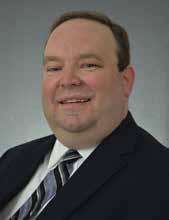
The following is a summary of a selected criminal opinion issued by the Third Court of Appeals in December 2023. The summary is an overview; please review the entire opinion. The subsequent history is current as of June 3, 2024.
>AGGRAVATED ROBBERY— EVIDENTIARY SUFFICIENCY AND LESSER-INCLUDED OFFENSE: Evidence was sufficient to prove that defendant committed aggravated robbery, and defendant was not entitled to instruction on lesser-included offense of theft.
Selman v. State, No. 03-22-00437CR (Tex. App.—Austin Dec. 8, 2023, no pet.) (mem. op., not des -
ignated for publication).
Selman stole a woman’s purse at the Buda HEB gas station. When Selman grabbed the purse from the woman’s car, the woman ran after Selman and “grabbed him by the throat” as he entered his vehicle and began to drive away. The woman was still holding on to Selman as he closed the car door on her arm repeatedly and drove around the parking lot. The woman was “dragged alongside” the vehicle until she let go and dropped to the ground when she saw that Selman was headed toward the exit to the highway.
Based on this incident, Selman was charged with and convicted of aggravated robbery.
On appeal, Selman argued that the evidence was insufficient to support his conviction and that he was entitled to an instruction on the lesser-included offense of theft. The appellate court disagreed with both contentions.
A person commits robbery if, “in the course of committing theft as defined in Chapter 31 and with intent to obtain or maintain control of the property,” he “intentionally, knowingly, or recklessly causes bodily injury to another.” Tex. Penal Code § 29.02(a)(1).
Selman first argued that the evidence was insufficient to prove that he caused the victim to suffer bodily injury while “in the course of” committing theft. In his view, the theft was complete when he stole the woman’s purse, and her injuries occurred after he stole her purse. However, the appellate court observed that the

Penal Code defines “in the course of committing theft” as “conduct that occurs in an attempt to commit, during the commission, or in immediate flight after the attempt or commission of theft.” The woman testified that she confronted Selman as he was taking her purse, that she chased him to his car when he fled, and that he immediately drove off. From this evidence, the jury could find that Selman was in immediate flight from the commission of theft when he drove away from the scene of the crime and dragged the woman across the parking lot.
The appellate court also rejected Selman’s contention that the evidence was insufficient to prove that his motor vehicle was a deadly weapon. The Penal Code defines a deadly weapon as “anything that in the manner of its use or intended use is capable of causing death or serious bodily injury.” Tex. Penal Code § 1.07(a)(17)(B). Selman argued that the only injury caused by the woman’s contact with his car was bruising on her arm, and there was no evidence that “closing a car door on someone’s arm [could] cause severe injury or death.” Selman added that her remaining injuries were not caused by the vehicle itself but “by the dragging of her body parts on the asphalt.” However, the court observed that the issue was not whether the woman’s injuries were caused by contact with the vehicle, but the manner in which Selman used the vehicle. From the evidence presented, the jury could find that driving at a high rate of speed while slamming the
woman’s arm in the door, when she was being dragged alongside the vehicle, was using the vehicle in a manner capable of causing death or serious bodily injury.
Next, Selman argued that he was entitled to an instruction on the lesser-included offense of theft. The appellate court concluded that although theft is a lesser-included offense of aggravated robbery, there was no “affirmative evidence that would enable a rational jury to conclude that appellant is guilty of theft instead of aggravated robbery.” The critical issue was the amount of time between when the defendant committed the theft and when he caused the injuries to the victim. The court contrasted the facts here to the facts of another case in which there was a “fifteen to thirty minute delay” between the theft and the act that elevated the theft to a robbery. In that case, the defendant was entitled to an instruction on theft. Here, on the other hand, Selman dragged the woman beside his car “immediately after the theft and with no break in the chain of events.” Thus, there was no evidence to show that Selman was guilty only of theft and not aggravated robbery. AL

The following are summaries of selected opinions issued by the Texas Supreme Court in June 2024. These summaries are prepared by court staff as a courtesy and are not a substitute for the actual opinions. The summaries are overviews of the opinions; please review the entire opinions.
CONSTITUTIONAL LAW:
Statutory regulations governing public insurance adjusters do not implicate protected speech.
Tex. Dep’t of Ins. v. Stonewater Roofing, Ltd., No. 22-0427, ___ S.W.3d ___ (Tex. June 7, 2024).
The issues in this challenge to Texas’ regulatory scheme for public insurance adjusters are whether professional licensing and conflict-of-interest constraints (1) restrict speech protected by the First Amendment and (2) are void for vagueness under the Fourteenth Amendment.
Stonewater offers professional roofing services but is not a licensed public insurance adjuster. A dissatisfied commercial customer claimed that Stonewater was illegally advertising and engaging in insurance-adjusting services.
To avoid statutory penalties, Stonewater sued the Texas Department of Insurance (TDI), seeking a declaration that two Texas Insurance Code provisions violate the U.S. Constitution. The first requires a license to act or hold oneself out as a public insurance adjuster. The second prohibits a contractor, whether licensed as an adjuster or not, from (1) serving as both a contractor and adjuster on the same insurance claim and (2) advertising dual-capacity services.
TDI filed a Rule 91a motion to dismiss, which the trial court granted but the court of appeals reversed.
The Supreme Court reversed and dismissed the suit, holding that Stonewater’s pleadings failed to state cognizable First and Fourteenth Amendment claims. Properly construed, the challenged statutes are conventional licensing regulations triggered by the role
a person plays in a nonexpressive commercial transaction, not what any person may or may not say. Neither the regulated relationship (acting “on behalf of” the insured customer) nor the defined profession’s commercial objective (“settlement of an insurance claim”) is speech. False advertising about prohibited activities is not protected speech, and any incidental speech constraints are insufficient to invite First Amendment scrutiny. Additionally, Stonewater’s as-applied and facial vagueness claims were foreclosed because the company’s alleged conduct clearly violated the statutes.
Justice Blacklock concurred, concluding that no speech is implicated because only representative, or agency, capacity is regulated.
Justice Young’s concurrence emphasized two points. First, in his view, regulating agency capacity is nearly irrelevant to the First Amendment’s applicability; what is determinative here is that the challenged statutes, at their core, regulate nonexpressive conduct. Second, extant First Amendment jurisprudence is poorly equipped to address legitimate public-licensing regulation that affects speech or expressive conduct more than incidentally.
TAX PROTESTS: Unsuccessful ad valorem tax protest does not preclude subsequent motion to correct appraisal roll.
J-W Power Co. v. Sterling Cnty. Appraisal Dist., No. 22-0974, and J-W Power Co. v. Irion Cnty. Appraisal Dist., No. 22-0975, ___ S.W.3d ___ (Tex. June 7, 2024).
The issue in these consolidated cases is whether an unsuccessful ad valorem tax protest under Section 41.41 of the Tax Code precludes a subsequent motion to correct the appraisal roll under Section 25.25(c) with respect to the same property.
J-W Power Company leases natural gas compressors to neighboring counties. The compressors at issue here were maintained in Ector County and leased to customers in Sterling and Irion counties. Between 2013 and 2016, the appraisal districts of Sterling and Irion counties appraised the leased
compressors as conventional business-personal property. This was despite the fact that the Legislature amended the Tax Code in 2011 so that leased heavy equipment like the compressors would be taxed in the county where it is stored by the dealer when not in use.
J-W Power filed protests in Sterling and Irion counties under Section 41.41 of the Tax Code, arguing that its compressors should be taxed elsewhere, but the protests were denied by the counties’ appraisal review boards. J-W Power did not seek judicial review.
After the Supreme Court clarified in 2018 that leased heavy equipment should be taxed in the county of origin, J-W Power filed motions under Section 25.25 to correct the appraisal rolls for the relevant years. After the appraisal review boards again denied J-W Power’s motions, J-W Power sought judicial review.
The trial court granted summary judgment for the districts. The court of appeals affirmed, holding that the denial of J-W Power’s Section 41.41 protests precluded subsequent motions to correct because of the doctrine of res judicata.
The Supreme Court reversed. Without deciding whether the elements of res judicata had been met, the Court held that Section 25.25(l), which allows a Section 25.25(c) motion to be filed “regardless of whether” the property owner protested under Chapter 41, eliminates any preclusive effect a prior protest may have had. The Court remanded the case to the court of appeals for further proceedings.
ADMINISTRATIVE LAW: Order adjusting electricity pricing during winter storm did not exceed commission’s authority.
Pub. Util. Comm’n of Tex. v. Luminant Energy Co., No. 23-0231, ___ S.W.3d ___ (Tex. June 14, 2024).
The main issue in this case is whether orders issued by the Public Utility Commission (PUC) during Winter Storm Uri exceeded the PUC’s authority under Chapter 39 of the Public Utility Regulatory Act.
The 2021 storm’s record-
low temperatures caused almost 50 percent of Texas’ power-generation equipment to freeze and go offline. The resulting imbalance in the supply and demand of electricity put the state’s electrical grid on the brink of collapse.
The wholesale price of electricity is determined by a complex mathematical formula administered by the Electric Reliability Council of Texas (ERCOT). When mandatory blackouts failed to return the grid to equilibrium, the PUC determined that its pricing formula was sending inaccurate signals to market participants about the state’s urgent need for additional power. In two orders, the PUC directed ERCOT to adjust the formula so that electricity would trade at the regulatory cap of $9,000/MWh instead of at the lower price the formula was producing.
Luminant challenged the orders in a statutory suit for judicial review against the PUC in the court of appeals. Chapter 39 states that the PUC “shall” use “competitive rather than regulatory methods to achieve the goals of [the] chapter to the greatest extent feasible.”
The court of appeals agreed with Luminant that the orders violated Chapter 39’s charge by directing ERCOT to set a single price for electricity.
The Supreme Court reversed and rendered judgment affirming the orders. After rejecting the PUC’s jurisdictional challenges to Luminant’s suit, the Court turned to the merits. Luminant’s challenge rested on Chapter 39’s express preference for competition over regulation. But the Court pointed to other language in Chapter 39 commanding the PUC and ERCOT to ensure the reliability and adequacy of the electrical grid and acknowledging that the energy market will not be completely unregulated. After applying the whole-text canon of statutory construction, the Court held that Luminant had not overcome the presumption that agency rules are valid. The Court went on to hold that the orders substantially complied with the Administrative Procedure Act’s emergency rulemaking procedures. AL
June 2024 District & County Court Jury Trial Update
Editor’s Note: A monthly update on jury trials in Travis County will also be circulated in Bar Code and posted in the Austin Bar app.
CIVIL
Ramos v. Regan
Cause No.: D-1-GN-22-007206
Judge: Jessica Mangrum, 200th Civil District Court
Trial Date(s): May 13-15, 2024
Attorneys:
Plaintiff: Casey Archer and Guilherme Vasconcelos, DJC Law, PLLC
Defendant: J. Hampton
Skelton and Sean Hoffman, Skelton and Woody, PLLC
Case Summary: Motor vehicle accident that occurred on June 12, 2022 in downtown Austin. Ramos and third-party defendant found responsible for accident. No damages awarded.
Amezquita v. Evans
Cause No.: D-1-GN-22-001572
Judge: Daniella Deseta Lyttle, 261st Civil District Court
Trial Date(s): May 14-16, 2024
Attorneys:
Plaintiff: Anthony Icenogle, Icenogle and Boggins, PLLC
Defendant: William Gammon and Benjamin Schmerler
Case Summary: Plaintiffs claimed ownership of property located in Austin through adverse possession. Court granted directed verdict that plaintiffs failed to establish adverse possession of the property.
Monroe v. JD Abrams LP
Cause No.: D-1-GN-22-003097
Judge: Jan Soifer, 345th Civil District Court
Trial Date(s): May 14-21, 2024
Attorneys:
Plaintiff: Jackson Morrison, Thomas J. Henry Law, PLLC
Defendant: Rodney P. Geer, Fee, Smith, & Sharp, L.L.P. Case Summary: Motor vehicle accident that occurred on March 31, 2021 on IH-35 in Austin. Defen-
dants were found responsible for the accident. Ten jurors awarded $113,143.00 in damages.
Goodman v. Ascension Seton
Cause No.: D-1-GN-22-002558
Judge: Karin Crump, 250th Civil District Court
Trial Date(s): May 14-23, 2024
Attorneys:
Plaintiff: Matthew Caponi and Austin Kaplan, Kaplan Law Firm, PLLC; Peter Kennedy, Graves, Dougherty, Hearon & Moody, P.C.
Defendant: John Scully and John Faubion, Cooper and Scully
Case Summary: Ten jurors found that the defendants defamed the plaintiffs, which resulted in her employment being terminated. The non-unanimous jury awarded $2,038,000.00 in total damages.
CRIMINAL
State v. Sanchez
Cause No.: D-1-DC-23-202636
Judge: Julie Kocurek, 390th Criminal District Court
Trial Date(s): May 7-8, 2024
Attorneys:
Defendant: Tara Lynn Witt
State: Kate Hall
Case Summary: Defendant found guilty of assault against a member of the family or household with previous conviction and sentenced to 20 years.
State v. Barahona
Cause Nos.: D-1-DC-24-904046, D-1-DC-24-904047
Judge: Brandy Mueller, 403rd Criminal District Court
Trial Date(s): May 7-13, 2024
Attorneys:
Defendant: Carlos Armando
Rodriguez
State: Dominic Selvera
Case Summary: Defendant found guilty of murder and sentenced to 35 years.
State v. Perez-Zeledon
Cause No.: D-1-DC-24-904054
Judge: Brad Urrutia, 450th Crim-
inal District Court
Trial Date(s): May 6-9, 2024
Attorneys:
Defendant: Leonard Martinez
State: Jason Rew-Hunter Case Summary: Defendant charged with sex abuse of child under 14, aggravated sexual assault of child, indecency with a child, et. al. Mistrial declared then negotiated plea entered.
State v. Carlysle
Cause No.: D-1-DC-22-301556
Judge: Bob Perkins
Trial Date(s): May 6-10, 2024
Attorneys:
Defendant: Bristol Myers
State: Jason Rew-Hunter Case Summary: Defendant charged with aggravated assault with deadly weapon. Mistrial declared.
State v. Hernandez
Cause No.: D-1-DC-23-904061
Judge: Tamara Needles, 427th Criminal District Court
Trial Date(s): May 13, 2024
Attorneys:
Defendant: Thomas Fagerberg
State: Kathryn Arnold Case Summary: Defendant charged with aggravated sexual assault. Jury discharged after motion filed for defendant to be examined for competency.
State v. Lopez Cause No.: D-1-DC-20-100024
Judge: Karen Sage, 299th Criminal District Court
Trial Date(s): May 13-16, 2024
Attorneys:
Defendant: Amber Vazquez
State: Brandy Gann Case Summary: Defendant convicted of murder and sentenced to 28 years.
State v. Kim Cause No.: D-1-DC-23-900103
Judge: Melissa Goodwin
Trial Date(s): May 20-24, 2024
Attorneys:
Defendant: Krista Chacona
State: Kiera Lay Kilday
Case Summary: Defendant convicted of murder; sentenced to 50
years for count one and 60 years for count two.
State v. Carbajal-Jaimes Cause No.: D-1-DC-17-302115
Judge: Jon Wisser
Trial Date(s): May 20-23, 2024
Attorneys:
Defendant: Mark Anthony
Chavez
State: Erik Nielsen
Case Summary: Defendant convicted of murder and sentenced to 10 years.
State v. Lanza Cause No.: D-1-DC-23- 300266
Judge: Bob Perkins
Trial Date(s): May 20-23, 2024
Attorneys:
Defendant: Raymond Espersen
State: Tamera Marshall
Case Summary: Defendant found guilty of aggravated sexual assault of a child and sentenced to 27 years. AL






Ward Celebrates 40 Years as Austin Bar’s Executive Director
On June 4, 2024, DeLaine Ward celebrated her 40th anniversary as executive director of the Austin Bar Association.
In 1984, when Ward saw the advertisement for the position, she was a recent journalism graduate from The University of Texas. She intended to become a journalist and took a job with the State Bar of Texas in order to add some bona fides to her resume.
“My boss at the State Bar saw the position and said, ‘You should apply,’” Ward said. “I was only 24 at the time. I thought, ‘I’m never going to get this job.’”
But, to her surprise, she did.
Ward’s 20th anniversary as executive director was commemorated on the front page of the July/ August 2004 issue of Austin Lawyer. That article describes a 1984 Austin Bar that is nearly unrecognizable today, with fewer than 1,000 members and a budget of just $75,000. The Bar was housed in the Brizendine House. There were only two sections, just a few committees, and, before Ward, no staff.
Once Ward was hired, she was responsible for organizing Bar events, putting out the monthly newsletter, overseeing the Bar’s Lawyer Referral Service, and doing all accounting by hand.
In the 40 years since Ward was hired, the Bar has changed more than it had in the 91 years between its founding in 1893 and 1984. During Ward’s tenure:
• The Bar moved out of the Brizendine House to a larger office on Lavaca Street. However, the Bar’s increasing staff soon outgrew that space and moved to 816 Congress, where it would be headquartered for more than 15 years before finally coming home to Hilgers House.
• The Bar’s membership increased from less than 1,000 to nearly 4,000, including lawyers, law professors, judges, paralegals, and law students.
• The Bar established 27 sec -
tions and 14 committees. And whereas the committees of the 1984 bar were very general in their missions, today’s committees serve very specific functions, such as the Adoption Day Committee, which helps organize the annual Austin Adoption Day.
• The Bar renamed itself in 2004, from the Travis County Bar Association to the Austin Bar Association.
• Also in 2004, the Austin Bar Foundation (ABF) was founded, with the goal of providing grants to deserving local organizations. To date, the ABF has awarded more than $480,000 in grants.
• The Austin legal community of 1984 did not have an LGBT bar. The Austin LGBT Bar Association was founded in 2013, and in 2019 it merged with the Austin Bar to become the Bar’s LGBTQ+ Law Section. Together with the ABF, the Section administers the LGBTQ+ Scholarship program, which awards multiple $5,000 scholarships to Texas law students from the LGBTQ+ community or who advocate for LGBTQ+ causes.
In Ward’s tenure, the Bar’s leadership has diversified significantly. The Bar had no women or minority presidents from 1893 to 1984. However, from 1984 to 2024, the Austin Bar has had its:
• First female president (Karen Johnson, 1985-86; later also the first female State Bar executive director, 1990-94)
• Second female president (Martha Dickie, 1988-89
• First Hispanic president (Richard Pena, 1990-91)
• Third female president (Judge Jan Soifer, 199495)
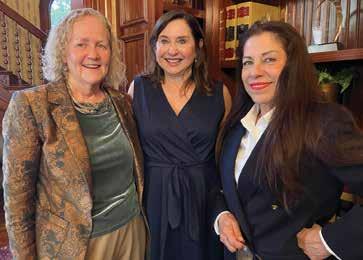
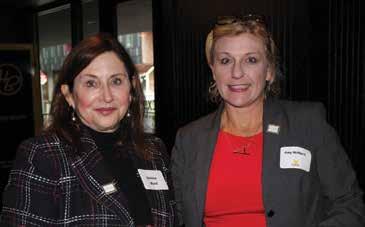
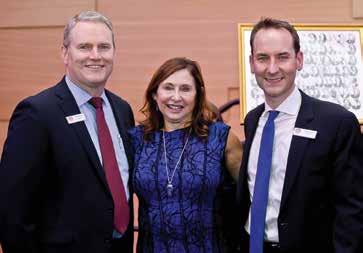
•
president
Joseph C. Parker, Jr., 199697)
Brees, 1999-2000)
• Sixth female president and second Black president (Velva Price, 2000-01)
• Second Hispanic president (Judge Jim Coronado, 2001-02)
• Seventh female president (Laura Bellegie-Sharp, 2003-04)
• Eighth female president (Jo Ann Merica, 2007-08)
• Ninth female president (Ann Greenberg, 2009-10)
• Tenth female president (Judge Elisabeth Earle, 2014-15)
• Third Black president (Judge Eric Shepperd, 2015-16)
• Eleventh female president (Leslie Dippel, 2016-17)
• Twelfth female president (Amy Wellborn, 2017-18)
• Thirteenth female president (Kennon Wooten, 202021)
• Fourteenth female president, third Hispanic president, and first Hispanic female president (Amanda Arriaga, 2022-23)
• Fifteenth female president (Justice Chari Kelly, 202324)
• Sixteenth female president (Mary-Ellen King, 202425)
Additionally, while the Bar has always been involved in pro bono legal efforts, it was only with Ward at the helm that we were able to put on regular pro bono events. For example, the ABF’s Veterans Legal Assistance Program puts on a monthly legal advice clinic at the VA, where volunteer attorneys advise veterans on legal matters. The Bar also created the CanLaw Clinic in 2017. This regular clinic pairs volunteer attorneys with individuals who have advanced-stage cancer to provide free estate-planning services.
While the success of the Austin Bar has been a joint effort of everyone involved, Ward’s role can’t be overlooked.
Stability is key to success, and Ward has certainly provided the Bar with stability over the past 40 years, creating a foundation on which we continue to build.
On behalf of the Austin Bar, thank you for your service, DeLaine Ward! AL
COVER continued from page 1.
felt deeply by all who knew her.”
As of June 24, the GoFundMe had accumulated more than $82,000.
If you would like to donate, visit gofundme.com/f/support-for-vicknair-family-in-tragic-times.
Vicknair will be deeply missed by all who knew her. Her legacy of love, kindness, and dedication to others will live on in the hearts of her family, friends, and the community she touched. AL






2023-24 Austin Bar and AYLA President’s Award Recipients

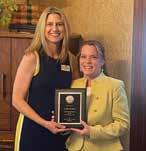
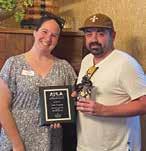
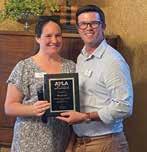
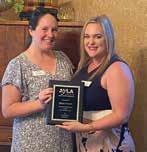
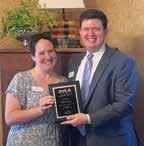
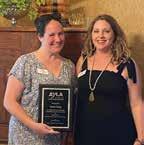
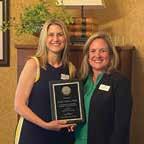
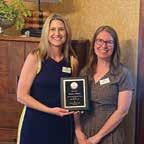
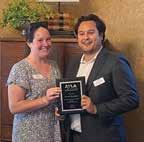

Austin Bar’s Fourth Annual Equity Summit a Success
Thank you to everyone who attended the fourth annual Equity Summit!
The event was chaired by Ketan Kharod and Matt Garcia and hosted by the Diversity, Equity and Inclusion Committee, cochaired by Elliott Beck and Leslie Dippel
More than 100 people attended the Equity Summit, which was held at the Austin Community College Rio Grande Campus.
This year’s event featured a discussion, moderated by Kharod, between Austin Bar past president Rev. Joseph C. Parker, Jr. and Diana Anzaldua, a licensed clinical social worker and founder of the Austin Trauma Therapy Center, on the root causes and intergenerational trauma of racism.
There was also a fascinating panel discussion with Brenda Alejo (Jackson Lewis), Melissa Carr (DuBois, Bryant & Campbell), Garcia (Barnett Garcia), Diana Melendez (Travis County Attorney’s Office), and Armin Salek (Youth Justice Alliance) on the experiences and challenges facing first-generation attorneys.
During the break, Beck presented this year’s Rev. Joseph C. Parker, Jr., Diversity Award to Manuel Escobar (McGinnis Lochridge). Escobar’s longtime friend Rudy Metayer spoke at length about his contributions to diversity and inclusion efforts in Austin.
The afternoon continued with Judge Maya Guerra Gamble (459th Civil District Court) moderating a panel discussion on rent legislation affecting diversity and inclusion. The panel members were Amy Beckstead (Beckstead, Terry, Ditto), Susan Burton (Cornell Smith), and Emily Frost (Frost Domel).
The day ended with a practical session on allyship. Judge Denise Hernández (Travis County Court at Law #6), Dominique McLeggan-Brown (U.S. Economic Development Administration), Marianne Nitsch (Graves Dougherty Hearon & Moody), and consultant Yasmin Turk discussed how DEI
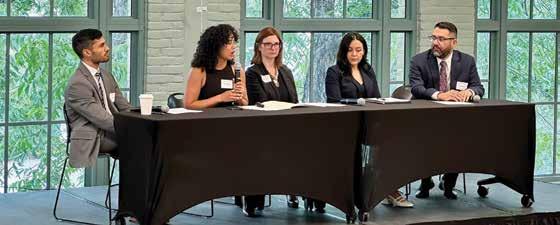
allies can put their words into action.
After the event’s conclusion, a reception was held at Hilgers House.
The committee would like to thank everyone who volunteered and participated, especially Mindy Gulati of Fundamental Advisory, who helped shape the vision for the afternoon.
Thank you also to this year’s Equity Summit sponsor, Judge Guerra Gamble, who has sponsored every Equity Summit since the event’s inception in 2021.
Judge Guerra Gamble was the inaugural chair of the Equity Committee, which was established in 2020 during Kennon Wooten’s presidency.
The Austin Bar is fortunate to have among its ranks individuals like Gulati and Judge Guerra Gamble, who work alongside us as we strive for inclusivity in our profession. AL

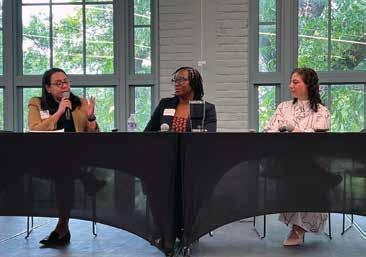
TCWLF/TCWLA Annual Grants & Awards Luncheon
Honors Local Attorneys, Gives $90,000 in Grants
The Travis County Women Lawyers’ Foundation (TCWLF) and Travis County Women Lawyers’ Association (TCWLA) held their annual Grants & Awards Luncheon on April 26, 2024, at the Fairmont Hotel.
TCWLF, the grant-giving arm of the association, gave away $90,000 in grants to 13 deserving local providers of pro-bono legal services to women, children, and families in Travis County this year at the sold-out signature luncheon. The TCWLF volunteer board worked throughout the year to solicit grant applications from local nonprofits, review and vet those applications, and follow up with recipients to ensure that the grants were used for their intended purposes.
Shuronda Robinson, CEO of Austin Woman magazine and a fourth-generation entrepreneur, was the keynote speaker. Mayor Kirk Watson gave a special welcome to attendees and officially proclaimed April 26 to be “Travis County Women Lawyers’ Day” in the City of Austin.
TCWLA presented Attorney Awards to recognize female lawyers who have shown excellence in their respective fields of practice.
Since 2002, the growth of TCWLF has been tremendous, particularly over the last five years. Thanks to the generosity of all the sponsors, guests who attended, and everyone who bought raffle tickets.
TCWLF is a non-profit 501(c) (3) entity. Any contribution is tax-deductible. To make a contribution or become a Fellow, please visit: https://tcwla.org/foundation-sign-up/#join.
Congratulations to this year’s grant recipients!
• Asian Family Support Services of Austin - $20,000 (Impact Grant)
• American Gateways - $5,000
• CASA of Travis County$5,000
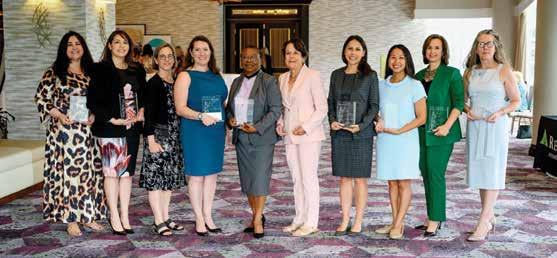


• Family Eldercare - $5,000
• Foster Angels - $5,000
• Foster Village - $7,500
• Lone Star Justice Alliance$5,000
• Seedling Foundation$5,000
• Texas Fair Defense Project - $7,500
• Texas Rio Grande Legal Aid: Foster Youth Project$5,000
• VECINA - $5,000
• Volunteer Legal Services of Central Texas - $5,000
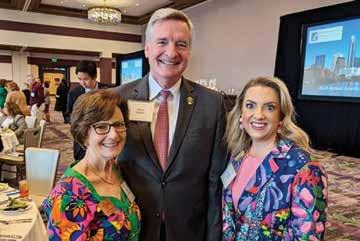
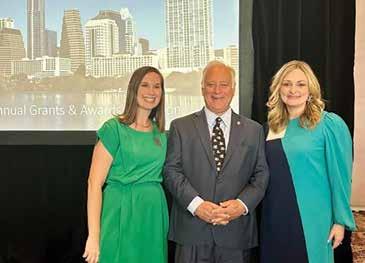
• Women’s Storybook Project of Texas - $5,000
• Young Women’s Christian Association of the University of Texas - $5,000
Congratulations to this year’s attorney award winners!
• Public Interest - Erica Grigg, Erica Grigg Counseling Services, PLLC
• Contribution to Minority CommunityAmanda Arriaga, General Counsel, Texas CASA
• Advancement of Women’s Interests - Maria Amelia Calaf, Botkin Chiarello Calaf AL

HOUSTON AUTO APPRAISERS
www.HoustonAutoAppraisers.com www.BOCAA.org – Become an IACP Certified Auto Appraiser Office:1-877-845-2368
Cellphone: 832-279-2368
Email: Roy@HoustonAutoAppraisers.com


Shifting Platforms: The Move to Online Tax Foreclosure Sales
BY BRUCE ELFANT, TRAVIS COUNTY TAX ASSESSOR-COLLECTOR & VOTER REGISTRAR
on top of what many taxpayers already can’t afford to pay. We even accept payments right up until auction time.
Property tax foreclosure auctions are older than the Republic of Texas. The battle for Texas independence began in part because the government of Mexico eliminated property tax exemptions for new settlers in 1830.1 For 200 or more years, on every first Tuesday of each month, property foreclosure auctions have been held outside on the steps of county courthouses, whether it was raining, snowing, or 110 degrees.
While my job as tax collector is to collect 100 percent of property taxes owed to fund local services, we have adopted a “compassionate collections” strategy. Properties are posted for foreclosure auctions only as a last resort. Our property tax team does everything possible to help property owners avoid having their properties auctioned off. We check to make sure appropriate exemptions are applied, seek out programs that could financially assist property owners with their property taxes, and work to set up realistic payment plans. Only after months or even years of attempting to work with property owners would we take the next step to seek judgments to collect owed property taxes. We pursue these cases with the county attorney’s office. Unlike other counties that outsource their collections, we don’t automatically add a 20-percent fee
As a result, with our 99-percent collection rate, very few properties are ever posted for foreclosure auctions. Last year, just 39 properties were scheduled to be auctioned on the courthouse steps. Twenty-two sold. It is common for concerned neighbors living near unkempt or abandoned properties to urge us to foreclose to get properties into someone’s hands who will take care of them. We can only do so when these property owners are delinquent (which is often the case) and have not been willing to work with us. Too frequently, properties posted for auction are struck off because the minimum bid is not achieved or no one bid. Many are commercial or vacant lots and not very desirable. The only property posted for the May auction was a cemetery, for which there were no bids. Why wouldn’t someone want to own a cemetery?
When I first ran for tax assessor-collector, I pledged to reduce collection costs by automating payments and processes, including online foreclosure auctions. The attraction of online auctions, besides the obvious benefits of bidders and staff not having to weather the often-harsh Texas elements, is the expectation of drawing additional bidders, higher bids, and the automation of all aspects of the auctions, including the electronic receipting of all funds. Online auctions have proven effective in Dallas and Nueces counties, where the tax collectors have reported receiving more bids for the total property taxes owed and fewer struck properties for lack of bids. Getting properties back on the property tax rolls benefits all taxpayers.
Travis County has contracted
Online auctions have proven effective in Dallas and Nueces counties, where the tax collectors have reported receiving more bids for the total property taxes owed and fewer struck properties for lack of bids. Getting properties back on the property tax rolls benefits all taxpayers.
with RealAuction to conduct online property foreclosure sales as authorized by Section 34.01(a-1) of the Texas Property Tax Code. Anyone not owing delinquent taxes may bid on the properties, but must register with the tax office and on RealAuction’s website before the sale. RealAuction offers training sessions for bidders. Bidders must pay a deposit of five percent of their intended total bid before the auction. The site provides information for each item, including the owner’s name, legal description, picture, and the opening or minimum bid. At the date and time specified for the sale, items are auctioned in order of sale number and sold to the highest bidder. Bidders can prebid, but cannot view other bids until the auction begins. Successful high bidders must pay the balance of their bid online by 4 p.m. the day of the sale.
While online foreclosure auctions will end a tradition that predates Texas, my guess is that the early settlers would have appreciated being able to bid on properties from the confines of adequately air-conditioned or heated homes and not having to saddle up for a cross-country trek to the courthouse.
Finally, a point of personal privilege as my retirement draws near: Some will remember that before serving as tax assessor-collector for the last 12 years, I held the of-
fice of Precinct Five constable for the previous 20 years. As a constable, I made the service of the civil process my top priority, especially the family law process. My office was the first in the nation to enable litigants to check service online and provide instant notifications when process was served. I served on committees to help create a place for the safe exchange of children (Kid’s Exchange, now Planet Safe) and co-chaired the committee that led to the establishment of Travis County’s Veteran’s Court. I co-chaired the Austin/Travis County Family Violence Task Force, which helped radically change how family violence cases were addressed. I am also proud of our work to improve the process of enforcing child support orders, which is what first brought me to the constable’s office in 1986.
Serving our community and collaborating with our legal community and so many others to help better protect our residents and make our legal system and government services more responsive to the issues at hand has been such an honor. Thank you to all I have worked with over many years and for all you continue to do to help make our community a better place. AL
ENDNOTE
1 Josh Haney Fiscal Notes, Texas Comptroller of Public Accounts, Nov. 2015.
Boost Cash Flow With Electronic Payment Solutions
BY ADRIAN AGUILER SPONSORED CONTENT
As the economy shifts online, law firms must adapt to clients’ evolving payment preferences, including accepting electronic payments (or e-payments). Why are e-payments beneficial for clients and law firms? This article highlights the most common advantages of electronic payments.
Advantages of Electronic Payments for Law Firms
1. Provide a Positive Client Experience
Clients increasingly prefer e-payment solutions, with 75% planning to switch to electronic payments and 87% of millennials favoring this change. Fiserv’s survey shows credit and debit cards are top choices, with younger consumers preferring debit cards (95%), payment apps (83%), and mobile wallets (82%).

Electronic payments attract new clients and serve existing ones, as 60% of consumers use digital payments, and 44% set up automated payments. Embracing e-payments ensures your firm remains competitive and responsive to client expectations in a cashless society.
2. Get Paid More and Faster
Electronic payments benefit law firms by enhancing efficiency and speeding up transactions. According to the LawPay and MyCase 2024 Legal Industry report, firms using LawPay collected 33% more from clients, with bills paid nearly four times faster than cash or check payments. Solutions like LawPay’s Next Day Payments enable receiving payments in as little as one business day. Additionally, e-payments simplify tracking payments, sending reminders, and eliminating lost invoices or checks, ensuring more revenue is collected.
3. Optimize Law Firm Workflows
Because online payment solutions allow for automated invoicing or recurring payments, electronic payments prove incredibly useful when you have client work on retainer or over repeated transactions. Many electronic payment solutions on the market also offer integrations with other software solutions that lawyers may use for their practice, such as case or practice management, timekeeping, and accounting/bookkeeping software. This prevents law firm managers from jumping between multiple tools or reconciling data from different programs.
4. Increase Data Security
Imagine you didn’t have to worry so much about the security of client financial information. With electronic payment solutions, that dream can be a reality.
Having an online solution means that your firm doesn’t have to store bank account details or credit card numbers on your own servers. As long as you select an established payment processor with high-grade security, your firm shouldn’t have to worry about your clients’ financial information safety.
Scale Your Firm Today With LawPay Online Payments
With LawPay, you’ll have access to the best, user-friendly billing and payment features that can make your business more profitable and productive—while delighting clients.
Payment features include:
• Next Day Payments: Enjoy faster access to your money – just one business day after the payment is initially received.
• Online Payment Options: Provide debit, credit, and eCheck options for faster payments and payment scheduling for convenience.
• Pay Later: Increase your revenue with legal fee financing loans –ensuring 100% payment upfront while clients pay in installments over time.
• Card Vault: Easily charge and collect payments using your client’s preferred payment method – stored in a secure, industry-compliant system.
When you’re ready to see how LawPay can benefit your firm firsthand, schedule a LawPay demo.
Austin Police Department Data Website Now Live
The Austin Police Department (APD) has launched a new website to publish data related to policing activities in the Austin metropolitan area.
APD’s Open Policing Data Release project was ordered by the Austin City Council’s Resolution 20230914-132, which was passed in September 2023.
The website is now live at https://datahub.austintexas.gov/ stories/s/8fv5-rasp and features 12 different datasets:
National Incident-Based Reporting System (NIBRS) Group A Crime
“This dynamic dashboard collects and categorizes crimes reported by individuals, affecting property, and impacting society from January 1, 2020, onward,” the website states. “Updated on a monthly basis, the data encompasses entire months, ensuring the most current and comprehensive information.”
Cadets in Training
“Cadets in Training data is collected from the APD Training Academy, beginning with the 143rd Cadet Class, which began on February 18, 2020,” the website explains. “The dataset includes both full cadet classes and modified classes. Modified classes are comprised of individuals who already hold a TCOLE (Texas Commission on Law Enforcement) Peace Officer license.”
Retirements and Separations
This dataset “includes a list of sworn officers who have retired or separated from the Austin Police [D]epartment, along with their retirement or separation date,” the website reads.
Computer Aided Dispatch Incidents
This dataset “includes information on two types of incidents: 911 calls, usually referred to as Calls for Service or Dispatched

Incidents, and officer-initiated incidents recorded in the Computer Aided Dispatch (CAD) system,” the website states. “Dispatched incidents are received via 911 calls, while officer-initiated incidents are created by officers in the field.”
Calls for Service
This dataset “is a filtered view of the APD Computer Aided Dispatch (CAD) Incidents dataset, focusing solely on incidents reported through 911 calls,” the website states.
Mental Health First Response Incidents
This dataset “is a filtered view of the APD Computer Aided Dispatch (CAD) Incident dataset, focusing exclusively on incidents that were related to mental health,” the website reads.
A CAD incident may be related to mental health for the following reasons:
1. The initial or final incident description indicated a mental-health component.
2. The call disposition description indicated that the call response involved a mental-health component.
3. A crisis counselor was assigned to the call.
4. An individual called 911 and asked for mental-health services or the 911 call-taker assessed that there was a mental-health component to the call.
5. The subject of a use of force related to the CAD incident was assessed to have displayed Emotionally Disturbed Person (EDP) conduct.
Use of Force with Demographics
“The Use of Force dataset contains offense incidents where an officer engaged in physical contact with a subject using their body or any object, device, or weapon, excluding instances of unresisted escorting or handcuffing of a subject,” the website reads.
Inquiries into Immigration Status
“The Inquiries into Immigration Status dataset includes documented incidents where the APD has made inquiries into a subject’s immigration status,” the website states.
Searches by Type with Demographics
“The Searches by Type dataset details the type of search conduct-
ed on a subject during a motor vehicle traffic stop, as well as the criteria used by the officer for conducting the search,” the website explains.
Commendations and Complaints
This dataset includes several subsets.
The Commendation subset “provides the commendation number, the date the commendation was filed, and the completed status of the commendation,” the website states.
Complaints can be filtered by one of three variables:
1) Complaints by Sector includes the total number of complaints filed with the APD Internal Affairs Unit, categorized by the sector in which the complaint occurred. As the website explains, “The Austin Police Department divides Austin into ten (10) geographic areas called sectors. Each sector is led by a Commander who oversees patrol operations within that boundary.” The sectors are: Adam; Airport; Baker; Charlie; David; Edward; Frank; George; Henry; and Ida. To visualize the boundaries of each sector, visit https://data.austintexas.gov/ stories/s/kkcy-rhtk. This subset also compiles complaints that oc -
curred in an “unknown” category and “out of city” category.
(2) Complaints by Status categorizes complaints based on where they currently stand in the administrative investigation process. The status categories are “pending,” “closed,” “active,” and “no status.”
(3) Complaints by Disposition is categorized by how the complaint was resolved. The disposition categories are “sustained,” “supervisor referral,” “no discipline,” and “administratively closed.”
Arrests by Lead Charge
“When an officer finds it necessary to arrest an individual, such as upon witnessing a crime, having probable cause, or acting on a judge-issued arrest warrant, they are required to write an arrest report,” the website reads. “The arrest report details the conditions of the arrest and directly pertains to the individual in question. Additionally, it includes specific details of the charges associated with the arrest.”
Warnings by Lead Charge
The Warnings dataset provides the case report number, the date the incident occurred, subject race and gender at the time of the interaction, and the lead charge,” the website states. “This dataset contains only instances where a warning was issued to the subject of the interaction for a violation.”
Each of these datasets can be filtered by council district, sector, and/or census block group.
Each dataset listed on the website includes a link to a training guide on how to use each dataset’s dashboard.
The website includes the following disclaimers:
1. The data provided is for informational use only and may differ from official Austin Police Department crime data.
2. The Austin Police Department’s databases are continuously updated, and changes can be made due to a variety of investigative factors, including but not limited to offense reclassification and dates.
3. Reports run at different
times may produce different results. Care should be taken when comparing against other reports, as different data collection methods and different systems of record may have been used.
4. The Austin Police Department does not assume any liability for any decision made or action taken or not taken by the recipient in reliance upon any information or data provided.
For issues related to the dashboards, please email APDOpenDataAssets@austintexas.gov. AL







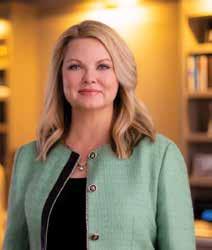






Bending the Rules: Four Years Ago, Arizona Eliminated ABA Model
Rule 5.4. How Has It Been Going?
At a January 2024 meeting of the Texas Access to Justice Commission, the commission voted against a recommendation to create a pilot program that would have allowed non-attorney ownership of entities licensed to provide limited legal services to low-income Texans.
The topic of nonlawyer ownership in legal entities has been a topic of growing interest in recent years.
Currently, Texas Disciplinary Rule of Professional Conduct 5.04 prohibits nonlawyers from having any economic interest in entities practicing law.
Many other states have their own versions of this rule, which is modeled on the American Bar Association (ABA)’s Model Rule 5.4.1
In 2020, Arizona became the first state to eliminate this rule,2 creating “alternative business structures,” or ABSs, to allow lawyers to share ownership of their law firms with nonlawyers.
In the years since, the Committee on Alternative Business Structures has released an annual report as required by the Arizona Code of Judicial Administration (ACJA) § 7-209.
As of May 10, 2024, the Certification & Licensing Division (CLD) of the Arizona Judicial
Branch has 72 licensed entities, 71 of which are currently active.3
In its first full year, Arizona’s ABS program received 32 applications. The ABS committee recommended 15 of these to the Arizona Supreme Court for licensure. All 15 were approved.
In its first full year, the committee reported that, of the 15 approved entities:
• 4 had equal lawyer/nonlawyer ownership;
• 9 had majority nonlawyer ownership; and
• 2 had majority lawyer ownership.
There were no reports of complaints or disciplinary actions in the program’s first year.4
In the program’s second year of activity, the ABS committee met eight times during calendar year 2022.
The CLD received 33 applications, and the ABS committee submitted 25 to the Arizona Supreme Court for licensure. All 25 were licensed. Additionally, the CLD renewed 13 licenses.
In December 2022, there were 39 entities licensed. Of these:
• 6 had equal lawyer/nonlawyer ownership;
• 27 had majority nonlawyer ownership; and
• 6 had majority lawyer ownership.
There were no reports of com-

plaints or disciplinary actions in the program’s second year.5
In calendar year 2023, the CLD received 59 applications and submitted 26 for licensure. The Arizona Supreme Court granted 25 of these. The reason for the license rejection was not included in the report.
In calendar year 2023, the CLD renewed 12 licenses.
As of Dec. 31, 2023, there were a total of 65 licensed entities.
While there were no complaints or disciplinary actions in calendar year 2023, there were 24 “charges” received against four different entities.
“The State Bar of Arizona reports the following data points as required under ACJA § 7-209,” the report for 2023 reads. “A charge is an allegation of wrong-
doing. Charges may be dismissed or resolved at intake or may progress to an investigation as a formal complaint.”
The nature and number of the charges are:
• Nature of charge not defined – 11
• Communication – 7
• Dishonesty, fraud, deceit, or misrepresentation – 4
• Terminating representation – 1
• Diligence – 1
The ACJA establishes a code of conduct6 that each ABS and its nonlawyer members must uphold, while lawyer members must also uphold the Arizona Rules of Professional Conduct.
The ACJA code of conduct states that no ABS, nor its members, may engage in any activity that interferes with the profes -

sional independence of lawyers or others authorized to provide legal services.
The code of conduct also states that an ABS must maintain records to demonstrate:
• Financial stability and business viability;
• Management of material risks to the business;
• Separation of legal-services clients’ property from the property of the ABS;
• Cooperation with the Arizona Administrative Office of Courts; ABS committee; State Bar of Arizona, presiding disciplinary judge; and any court that oversees and investigates concerns related to the delivery of legal services;
• Prompt action to address remedial action requested by the entities listed above.
To ensure compliance with these points, the ABS committee recommends a “compliance lawyer” perform a semi-annual audit with the help of ABS personnel.
A sample compliance audit7 asks the compliance lawyer to list:
• The total number of attorneys at the ABS;
• The total number of nonlawyer employees, including 1099 staff;
• The total number of “authorized persons”8 at the ABS;
• Total clients to date;
• Total new clients since previous audit;
• Practice areas; and
• Arizona counties served.
The Committee on Alternative Business structures is continuing to develop the ABS program. Specifically, the committee has created five workgroups to consider each of the following topics:
1. Revisions to the ACJA;
2. Revisions to the ABS application form and process;
3. ABS audit processes;
4. ABS program data collection; and
5. Informational training development for compliance lawyers and nonlawyer owners.
The workgroups will meet throughout 2024 and submit recommendations to the committee for review.9 AL
ENDNOTES
1 https://www.americanbar.org/ groups/professional_responsibility/
publications/model_rules_of_professional_conduct/rule_5_4_professional_independence_of_a_lawyer/.
2 https://www.reuters.com/ legal/legalindustry/arizona-approves-five-more-entities-new-legal-business-structure-2021-08-27/.
3 https://www.azcourts.gov/Portals/26/ABS%20Master%20Directory%20May%2010%2C%202024.pdf.
4 https://www.azcourts.gov/ Portals/26/2021%20ABS%20 Committee%20Report%20to%20 Supreme%20Court_1.pdf.
5 https://www.azcourts.gov/Portals/26/Final%202022%20ABS%20 Committee%20Report%20to%20 Supreme%20Court%202023-05-09. pdf?ver=cQfBTMoqhS2R9JZ5gaAeMg%3d%3d.
6 ACJA § 7-209(K).
7 https://www.azcourts.gov/Portals/26/ABS%20Sample%20Compliance%20Audit%20Form.pdf.
8 ACJA § 7-209(A) (“a person possessing: 1. An economic interest in the alternative business structure equal to or more than 10 percent of all economic interests in the alternative business structure; or 2. The legal right to exercise decision-making authority on behalf of the alternative business structure”).
9 https://www.azcourts.gov/Portals/26/ABS%20Committee%20 Annual%20Report%20to%20 Supreme%20Court%20for%20 2023%20-%20FINAL.pdf.

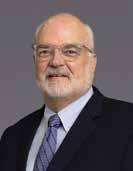



What’s With a Trust? (Part Two)
BY ZACHARY WIEWEL, J.D., LL.M. (TAX), TEXAS TRUST LAW
In Part One of this series (in the April 2024 issue of Austin Lawyer), I explained the benefits of a revocable living trust on incapacity. However, incapacity is only half the story. Trusts are also popular because of the benefits they can provide on death.
First, trusts can avoid probate. A surprisingly common misconception is that a decedent can avoid probate by having a will. This could not be further from the truth, of course. Whether you have a will or not, you go through probate; the best way to avoid it is through a revocable living trust.
But what is probate?
In short, probate is a title-changing machine. In Texas, if you die with your name on
an asset, whether it be a bank account, house, or any other asset, probate is the court-ordained process to remove the deceased’s name from that asset and retitle it in the name of their heirs. When a person dies intestate, the State of Texas statutorily determines their heirs. If a person dies testate (i.e., with a valid will), the deceased gets to choose who the heirs are. However, most people do not like probate. To start, it can cost a lot. The best numbers indicate that fees range between 2-3% of an estate’s value. While this may be high in some cases, it is accurate for others—especially if problems occur. Probate also takes time, lasting on average nine months. Finally, at least in Travis County, when there is a probate, the deceased’s will becomes a public record and is posted on the internet.
So, how do trusts avoid probate?
“Funding” a trust means transferring the ownership of an asset from the name of an individual owner into the name of the trustee of the trust. With a fully funded trust, probate can be avoided because when a person creates and funds a trust, their name is not actually on anything at death—all assets are either titled in the name of their revocable living trust or designated to go to the trust (or

other individuals) on death. If the deceased’s name is not on anything, then their name does not need to be taken off of anything; if their name doesn’t need to be taken off off of anything, then their will does not need to be submitted to probate to remove their name. Therefore, the entire estate plan can remain private.
While there are still fees associated with administering a trust on death, avoiding probate can reduce those fees, shorten the time it takes to administer an estate, and avoid the often unpleasant task of a family member appearing in court. Plus there is nothing to post on the internet about the deceased or the beneficiaries!
Second, a person can avoid probate proceedings in multiple states. When a person dies with real property in a state other than Texas, there needs to be a probate in the state of that real property. However, with a trust, that outof-state property should also be titled in the name of the trust. A probate is no longer necessary because the deceased’s name is not on the property at death.
Third, trusts can more easily allow for the disinheritance of a family member, which is not uncommon. While a blood relative of a decedent has standing to challenge a will, only a beneficiary of a trust
has standing to challenge a trust; by specifically excluding a person by name in the trust, one avenue to attacking the trust has been mitigated. Further, because trusts are created during the trustmaker’s life and are often in existence for many years before the trustmaker dies, it is harder for an excluded family member to argue that the trustmaker lacked capacity.
Finally, trusts can provide significant protection of an inheritance to the ultimate beneficiaries. However, another common misconception with a revocable living trust is that the trustmaker’s assets are protected in the event of a lawsuit. Again, this is not true. In addition to Texas’s generous exempt property statutes, LLCs, limited partnerships, corporations, and umbrella insurance policies are the best options to make an estate more impervious to an attack by creditors. Although certain irrevocable trusts can be created to lawsuit-protect a beneficiary’s inheritance, in Texas, the trustmaker cannot protect his or her own assets from his or her own creditors.
To conclude, although a trust is not a perfect fit for everyone, these are some common reasons why trusts are so widespread and are a legal instrument that will be around for generations to come. AL
Sublease Available
Law firm is relocating in June. Leaving spacious, well-maintained and furnished offices conveniently located just off Mopac and Far West. Easy access to downtown. Eleven offices (9 on glass overlooking lovely and verdant courtyard). Two conference rooms (one seats 12 and is appointed with TV and Zoom camera for hearings). Large war room with three large working tables. Large kitchen and pantry with kitchenware and appliances. Two large rooms for files and other storage with ample shelving and cabinets. Handmade receptionist station with cabinetry. The space is Ideally laid out for small but growing law firm or accounting firm. Good management and cleaning. Rent is relatively inexpensive and lease renewal would not be a problem.
Please contact Brian Walker at brian walker@cushwake com or 512-370-2456 for more information.

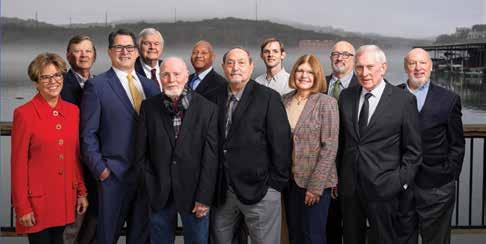
Gov. Abbott Begins Populating Fifteenth Court of Appeals, Austin Business Court
Gov. Greg Abbott has started appointing individuals to the newly created Fifteenth Court of Appeals and the Austin business court division (see “Briefs,” page 10).
Fifteenth Court of Appeals
Effective Sept. 1, 2024, all cases pending in the First through Fourteenth Courts of Appeals filed on or after Sept. 1, 2023, and which fall under the jurisdiction of the Fifteenth Court of Appeals, shall transfer to that court.
Amendments to Government Code Section 22.220(d), passed by the Texas Legislature and effective Sept. 1, 2023, give the Fifteenth Court of Appeals exclusive intermediate appellate jurisdiction over matters brought by or against any entity under the executive branch of the state government, such as a board, commission department, office, university system, or institution of higher education. The court will also hear appeals on matters brought by or against an officer or employee of the aforementioned entities arising out of that individual’s official conduct.
However, the court shall not hear appeals when an individual’s official conduct results in the following: a proceeding under the Family Code; Chapter 7B, Article 17.292, or Chapter 55 of the Code of Criminal Procedure; Chapter 101 or Chapter 125 of the Civil Practice and Remedies Code to enjoin a common nuisance; Chapter 22A or Subchapter E-1 of Chapter 411 of the Government Code; Chapter 21 of the Labor Code; a removal action under Chapter 87 of the Local Government Code; or Chapter 841 of the Health and Safety Code.
Further, the court shall not hear appeals in the following: a proceeding brought against a district attorney, a criminal district attorney, or a county attorney with criminal jurisdiction; a mental health commitment; a civil
asset forfeiture; a condemnation proceeding for the acquisition of land or a proceeding related to eminent domain; a claim of personal injury or wrongful death.
Business Court
There are 11 business court divisions statewide. Austin’s division is the Third Administrative Judicial Region, composed of the counties of Austin, Bell, Blanco, Bosque, Burnet, Caldwell, Colorado, Comal, Comanche, Coryell, Falls, Fayette, Gonzales, Guadalupe, Hamilton, Hays, Hill, Lampasas, Lavaca, Llano, McLennan, Milam, Navarro, Robertson, San Saba, Travis, and Williamson.
The business court has the powers provided to district courts, including the power to issue writs of injunction, mandamus, sequestration, attachment, garnishment, and supersedeas; and to grant any relief that may be granted by a district court.
The business court’s civil jurisdiction is concurrent with district courts in the following types of actions:
• if a party to the action is a publicly traded company, regardless of the amount in controversy;
• actions seeking injunctive relief or declaratory judgment under Chapter 37 of the Civil Practice and Remedies Code involving a dispute based on a claim within the court’s jurisdiction under Subsection (b), (c), or (d).
Amount in Controversy Exceeding $5 Million (excluding interest, statutory damages, exemplary damages, penalties, attorney’s fees, and court costs):
• derivative proceedings;
• actions regarding the governance, governing documents, or internal affairs of an organization;
• actions in which a claim under a state or federal securities or trade reg-

ulation law is asserted against an organization, a controlling person, an auditor, or an underwriter of securities issued by the organization;

• actions by an organization, or an owner of an organization, if the action is brought against an owner or controlling person; and
• actions arising out of the Business Organizations Code.






Amount in Controversy Exceeding $10 Million (excluding interest, statutory damages, exemplary damages, penalties, attorney’s fees, and court costs) for actions arising out of:
• a qualified transaction;
• a commercial transaction in which the parties agreed that the business court has jurisdiction of the action, except in the case of an insurance contract;
• a violation of the Finance Code or Business & Commerce Code by an organization other than a bank, credit union, or savings and loan association.
The business court has supplemental jurisdiction over any other claim related to a case or controversy within the court’s jurisdiction that forms part of the same case or controversy. A claim within the business court’s supplemental jurisdiction may proceed in the business court if all parties agree, including the judge of the division of the court before which the action is pending.
If the parties involved in a claim within the business court’s supplemental jurisdiction do not agree for that claim to proceed in the business court, it may proceed concurrently in a court of original jurisdiction with related claims proceeding in the business court.
Unless the claim falls within its supplemental jurisdiction, the business court does not have jurisdiction over:
• a civil action brought by or against a governmental entity, or to foreclose on a lien on real or personal property;
• a claim arising out of Subchapter E, Chapter 15, and Chapter 17 of the Business & Commerce Code; the Estates Code; the Family Code; the Insurance Code; and Chapter 53 and Title 9 of the Property Code;
• a claim arising out of the production or sale of a farm product;
• a claim related to a consumer transaction; and
• a claim related to the duties and obligations under an insurance policy.
Even if it falls under its supplemental jurisdiction, the business court shall not hear:
• a claim arising under Chapter 74 of the Civil Practice and Remedies Code;
• a claim in which a party seeks recovery of monetary damages for bodily injury or death; or
• a claim of legal malpractice.
Business court judges are appointed in even-numbered years for two-year terms. Unless reauthorized by the legislature and funded through additional appropriations, business courts will be abolished on Sept. 1, 2026. AL
ADVERTISERS



